Cow, Sheep, and Alpaca Care
To the east of the horse stable on your farm is the livestock barn. This building can hold up to 8 cows, sheep, and alpaca. The barn also contains a breeding stall and a silo to hold up to 999 fodder. As you won't receive a free cow in this version of Story of Seasons, you'll need to head over to Yodel Ranch to purchase your livestock animals.
Cows will produce milk every day, sheep will produce wool every 7 days, and alpaca will produce fleece every 7 days.
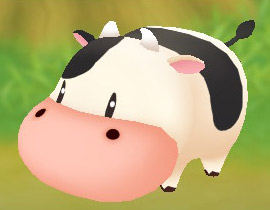
Calf
5000 G
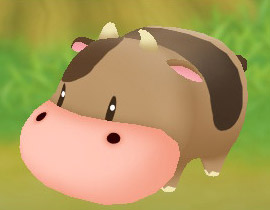
Coffee Calf
10,000 G
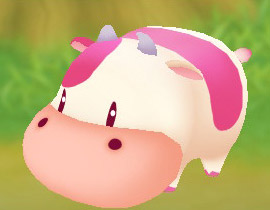
Strawberry Calf
10,000 G
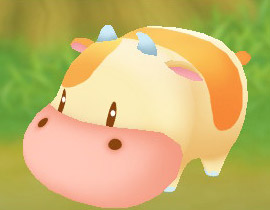
Fruit Calf
10,000 G
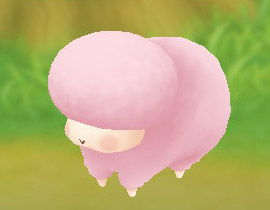
Sheep
4000 G
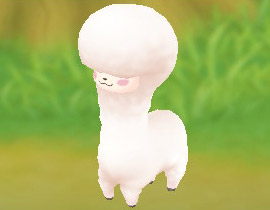
Alpaca
4000 G
The sheep and alpaca that Mugi sells are adults, but the cows are only medium sized. The store-bought cow will mature in 9 days (if you feed it every day). If you miss a day of feeding, then the cow will take an extra day to mature, up to a maximum of 14 total days.
You can expand your barn by ordering a barn renovation at the Workshop. Gotts will require you to supply 400 Lumber, 250 Material Stone, and 6800 G. After the 3-day remodel, the barn will hold up to 16 livestock and contain two birthing stalls. Saibara will sell the Cheese Maker, Butter Maker, and Yarn Maker at his forge shop after the remodel is complete.
A cow, sheep, or alpaca cannot get sick or die of old age.
Selling Animals to Yodel Ranch
Mugi will also buy unwanted animals from you. The price Mugi offers is based on the quality of product the animal produces:
| Animal | Baby | (S) Goods | (M) Goods | (L) Goods | (G) Goods | (P) Goods |
|---|---|---|---|---|---|---|
| Normal Cow | 3000 G | 3000 G | 4000 G | 5000 G | 6000 G | 7000 G |
| Coffee, Fruit, and Strawberry | 4000 G | 4000 G | 5000 G | 6000 G | 7000 G | 8000 G |
| Sheep and Alpaca | 2000 G | 2000 G | 2500 G | 3000 G | 4000 G | 5000 G |
Friendship
Each livestock animal has friendship heart markers, located inside the Animals Section of the Relationships menu. The more hearts an animal has, the better the quality of the goods it will produce. Each heart of friendship is worth 24 points. Heart #1 is zero points to 24 points, heart #2 is 25 points to 49 points, and so on.
You can increase your friendship with your animals by:
- Talking to your livestock
- Hand-feeding (hold the fodder in your hands and press the Action button to gift it to the animal)
- Spend at least 5 hours outside (sunny or snowy weather only)
- Use the brush tool to clean the livestock
Each of these actions can earn +1 friendship point per day, and you can't lose earned friendship points.
You can obtain animals that have more than 5 hearts of friendship via animal breeding.
Feeding
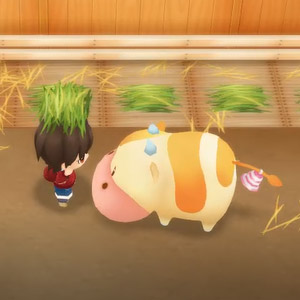
Cows will produce milk every day as long as they are fed fodder or grass the prior day. You can hand-feed them fodder; let the animals graze outside during spring, summer, or autumn (pasture grass does not grow during winter); or put fodder into the feed bins inside of the barn. When letting the cows graze outside by using the bell attached to the exterior of the barn, the growing grass must be accessible to the cows or they will go hungry and not produce milk the next day. When putting fodder into the barn's feed bins, that fodder will be consumed overnight. If you put fodder into the feed bins and then let the animals graze outside on pasture grass for the day, the feed-bin fodder will be wasted and disappear the next morning.
You can produce fodder by cutting the pasture grass you are growing in your field. In prior entries of the series, the pasture grass could be cut and then regrows in the same spot. In this version, the cut pasture grass is removed from the ground, but the remaining grass can fill-in the empty spot by growing sideways. Every day during spring, summer, and autumn, the pasture grass has a 25% chance of creeping into an adjacent patch of empty field space. The field will spread itself from square to square until it reaches the edge of the field or a field obstacle such as a boulder, crop, or stump. Place Lumber in the field to control how far the pasture grass can spread.
Fodder can be stored in the barn's silo. The chute to the silo is accessible from both inside and outside of the barn. Simply hold the fodder as the active item in your rucksack and press the A Button to place the fodder into the silo. The silo's capacity is 999 Fodder, but this can be expanded to 9999 by hiring Gotts to remodel the silo for 300 Lumber, 200 Material Stone, and 6800 G
Unlike cows, sheep and alpaca will regrow their hair without needing to be fed every day.
You can use the farm bell to bring the animals outside during winter if it is sunny or snowy weather, but because there is no fodder grass growing, ensure that fodder is being placed in the feed bins within the barn so the animals don't go hungry. The wintertime dormant fodder grass has a 70% chance of sprouting back when springtime returns.
Harvesting
An animal produces (S)mall goods when it has 0 to 3 hearts, (M)edium goods when it has 4 to 7 hearts, (L)arge goods when it has 8 or more hearts, (G)old goods when it has won its animal festival and spent less than 1000 hours outside, and (P)latinum goods when it has won its animal festival and spent 1000 hours or more outside. The last quality, (X), is a 1 in 255 chance of appearing when harvesting goods from a P-producing animal. A G-producing cow will become a P-producing cow once it reaches the 1000-hour limit and will not return to being a G-producing cow.
Cow milk can be collected by using the Milker, available from Saibara's shop for 2000 G after you buy your first cow from Mugi. Sheep and alpaca hair can be sheered by using the Clippers (1800 G at Saibara's). Both animals take 7 days to regrow their sheered wool or fleece.
Animal products can be processed in the Maker machines, which can be purchased from Saibara after the barn has been upgraded in size. While both sheep wool and alpaca fleece can be converted into yarn, only normal cow's milk can be converted into cheese and butter. The resulting cheese will be of an equal quality of the cow's milk added to the Cheese Maker, but the butter will be the same type regardless of the quality of the milk placed into the Butter Maker machine.
| Name | Criteria | Profit |
|---|---|---|
| Normal Cow | ||
| Milk (S) | Cow with 0 to 3 hearts | 100 G |
| Cheese (S) | Milk (S) into Cheese Maker | 250 G |
| Milk (M) | Cow with 4 to 7 hearts | 220 G |
| Cheese (M) | Milk (M) into Cheese Maker | 380 G |
| Milk (L) | Cow with 8 to 10 hearts | 360 G |
| Cheese (L) | Milk (L) into Cheese Maker | 540 G |
| Milk (G) | Cow with 8 to 10 hearts and won the Moo Moo Festival | 500 G |
| Cheese (G) | Milk (G) into Cheese Maker | 700 G |
| Milk (P) | Cow with 8 to 10 hearts, won the Moo Moo Festival, and has spent 1000 hours outside | 600 G |
| Cheese (P) | Milk (P) into Cheese Maker | 820 G |
| Milk (X) | 1 in 255 chance from a Milk (P) producing Cow | 800 G |
| Cheese (X) | Milk (X) into Cheese Maker | 1500 G |
| Butter | Any quality of normal Milk into the Butter Maker | 150 G |
| Special Cows (Coffee, Fruit, or Strawberry) | ||
| Coffee, Fruit, or Strawberry Milk (S) | Special Cow with 0 to 3 hearts | 120 G |
| Coffee, Fruit, or Strawberry Milk (M) | Special Cow with 4 to 7 hearts | 240 G |
| Coffee, Fruit, or Strawberry Milk (L) | Special Cow with 8 to 10 hearts | 400 G |
| Coffee, Fruit, or Strawberry Milk (G) | Special Cow with 8 to 10 hearts and won the Moo Moo Festival | 550 G |
| Coffee, Fruit, or Strawberry Milk (P) | Special Cow with 8 to 10 hearts, won the Moo Moo Festival, and has spent 1000 hours outside | 660 G |
| Coffee, Fruit, or Strawberry Milk (X) | 1 in 255 chance from a (P) milk producing Special Cow | 900 G |
| Sheep | ||
| Wool (S) | Sheep with 0 to 3 hearts | 400 G |
| Wool (M) | Sheep with 4 to 7 hearts | 700 G |
| Wool (L) | Sheep with 8 to 10 hearts | 1300 G |
| Wool (G) | Sheep with 8 to 10 hearts and won the Fluffy Festival | 2500 G |
| Wool (P) | Sheep with 8 to 10 hearts, won the Fluffy Festival, and has spent 1000 hours outside | 3200 G |
| Wool (X) | 1 in 255 chance from a Wool (P) producing Sheep | 3600 G |
| Alpaca | ||
| Alpaca Fleece (S) | Alpaca with 0 to 3 hearts | 420 G |
| Alpaca Fleece (M) | Alpaca with 4 to 7 hearts | 740 G |
| Alpaca Fleece (L) | Alpaca with 8 to 10 hearts | 1360 G |
| Alpaca Fleece (G) | Alpaca with 8 to 10 hearts and won the Fluffy Festival | 2700 G |
| Alpaca Fleece (P) | Alpaca with 8 to 10 hearts, won the Fluffy Festival, and has spent 1000 hours outside | 3500 G |
| Alpaca Fleece (X) | 1 in 255 chance from a Fleece (P) producing Alpaca | 4000 G |
| Yarn (Both Sheep and Alpaca) | ||
| Yarn (S) | Wool (S) or Alpaca Fleece (S) into the Yarn Maker | 530 G |
| Yarn (M) | Wool (M) or Alpaca Fleece (M) into the Yarn Maker | 920 G |
| Yarn (L) | Wool (L) or Alpaca Fleece (L) into the Yarn Maker | 1400 G |
| Yarn (G) | Wool (G) or Alpaca Fleece (G) into the Yarn Maker | 2000 G |
| Yarn (P) | Wool (P) or Alpaca Fleece (P) into the Yarn Maker | 2800 G |
| Yarn (X) | Wool (X) or Alpaca Fleece (X) into the Yarn Maker | 3200 G |
The farmhouse kitchen also contains a recipe for Milk (X) and Cheese (X). The recipe for Milk (X) is learned via inspiration after cooking 50 recipes that use Milk (S), 25 recipes that use Milk (M), and 10 recipes that use Milk (L). The recipe for Cheese (X) is learned via inspiration after cooking 50 recipes that use Cheese (S), 25 recipes that use Cheese (M), and 10 recipes that use Cheese (L). There are no cooking recipes for Wool (X), Alpaca Fleece (X), or Yarn (X).
Breeding
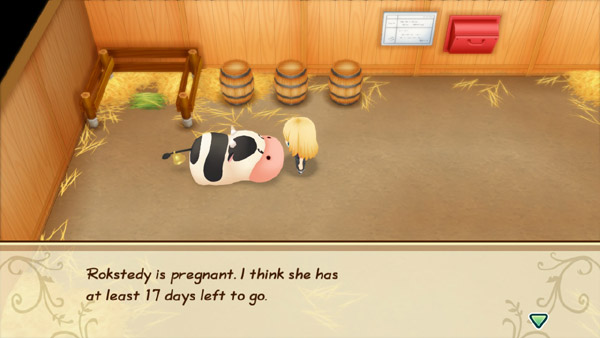
The livestock from Mugi's store are locked to having a maximum of 5 hearts. Breeding the existing animals will result in offspring with more than 5 hearts. Each animal born on your farm will have 1 more heart than its parent. To obtain animals with 10 hearts, you must breed to have a baby with +1 heart, then breed that baby after it mature so its baby has +1 heart, and so on.
Mugi sells pregnancy kits in his shop for 3000 G. The Cow Breeding Kit works for both the normal cows and the special cows.
Simply equip the breeding kit as a tool and use it on the intended animal. For sheep and alpaca, the momma animal must have its wool or fleece for the breeding kit to be effective. There also needs to be space in the livestock barn for the future newborn.
The next day after using the breeding kit, the pregnant animal will stand in the birthing areas within the livestock barn. It will not go outside until the baby animal is born. During this time, feed the pregnant animal or the pregnancy will take longer. A typical animal pregnancy lasts 21 days. When a day of feeding is missed, the pregnancy will last one extra day for each day the animal went hungry, up to a maximum of 30 days. If a birth was to occur on a festival day, the birth will shift over to the next non-festival day.
Growing Up
Baby cows grow in two stages: baby and calf. A tiny baby cow takes 14 days to grow into a calf if it is fed every day. Just like with pregnancy, a skipped feeding will add an extra day to its growth, up to a maximum of 20 total days for the little guy to grow into a calf. When a calf, it then takes 9 more days to mature (if fed daily) or up to 14 total days (if unfed) to grow into a mature cow.
Sheep and alpaca only have one growth stage. A fluffy baby takes 14 days if it is fed every day. If a day is skipped, then that adds an extra day to its growth cycle, up to a total maximum of 20 days.